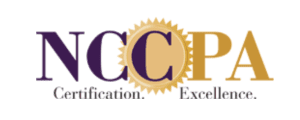
I applaud the NCCPA’s vision in looking at the PAs in practice today and the needs of all providers. Let’s face it folks, we have a unique advantage which also creates a disadvantage. We can jump from ortho to GI, from OB/GYN to urgent care. We have lateral mobility. BUT… a standardized PANRE exam harms those of us who are specialty providers. Here are the proposed changes from the NCCPA.
Ask yourself, how can you support the PA profession and the NCCPA in this endeavor?
NCCPA is exploring a new model for the Physician Assistant National Recertifying Exam (PANRE) to address a significant shift into specialty practice throughout the spectrum of healthcare. Our challenge is to reconcile two divergent interests:
(1) a desire to preserve the generalist nature of the PA-C credential, which is fundamental to the profession and the flexibility PAs have to change specialties during their career, and
(2) a call from PAs for exams that are more relevant to their current practice. We believe the model we are exploring balances those two important concerns.
Under the proposed PANRE model, both general medicine and specialty knowledge would be assessed during every 10-year certification maintenance cycle. This allows us to maintain the generalist nature of the PA-C credential – in support of PAs’ flexibility to change specialties – while also assessing knowledge most relevant to their current area of practice.
This model incorporates take-at-home exams to test the broad base of core knowledge all PAs should maintain as generalist-educated providers who are able to change specialties. PAs will be able to consult resources—colleagues or medical textbooks and journals—to help determine the correct answers on topics they may not encounter every day in their specialty, making this a learning experience that PAs have told us is an important part of recertification.
These content of these new take-at-home exams would be different than the content of today’s PANRE and different that the old Pathway II take-at-home exam. Neither of those were designed to assess core knowledge. I believe these new exams would support the maintenance of an important base of knowledge more effectively than anything NCCPA has offered in the past.
The model still includes a proctored, timed exam, but in this new paradigm that exam would be much more closely related to the day-to-day clinical practice of PAs. Instead of a one-size-fits all PANRE, PAs will have many exams – we believe 10 to 12 options at the start – from which to choose, giving them the opportunity for assessment in the content area that is closest to their area of expertise and experience. Gone would be the days of having to spend months cramming for a broad-based, general medicine exam.
For both the core knowledge and specialty exam components, the model includes remediation opportunities for those scoring near the pass/fail mark that would allow them to remediate through CME instead of retaking the exam.
We believe this model strikes an effective balance between two competing concerns: maintaining the generalist credential while testing PAs on content relevant to their practice.
Healthcare continues to become more complex, and PAs are becoming increasingly visible and critical to successful delivery of care in every clinical setting and specialty. Modernizing the recertification exam process to reflect the current and future state of practice is an obligation we have to PAs and to all who rely on the certification we confer.
That said, this is an ongoing process – we want and need to hear from PAs and those who rely on the certification we confer. We are engaged in a public comment period of several months (ending in March) before the board makes a final decision. We look forward to frank yet professional discussions that will enable us to conclude this exploratory process and implement a recertification model that best serves PAs and patients.
 1-800-263-6840
1-800-263-6840 Info@CME4LIFE.com
Info@CME4LIFE.com.png)
.png)
















